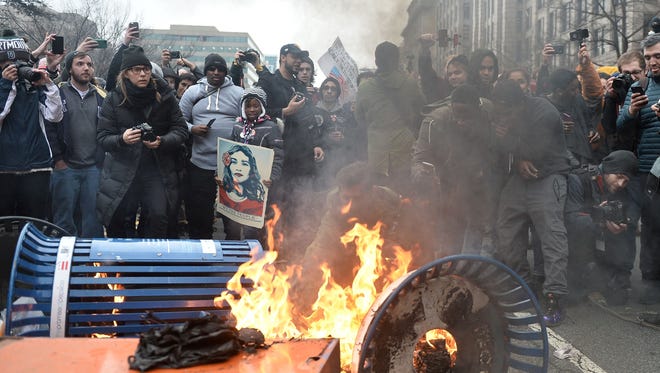Trump administration's new threat to free speech
The government has the right to investigate violent protesters, but they've launched an over-broad fishing expedition that undermines our rights.

It is the nature of power. Governments tend to focus on what they can do rather than what they should do in the use of authority. After all, officials view their own motivations and purposes in the most benign light.
Of course, those same actions can be viewed in a very different light by citizens targeted by the government. That is the conflict unfolding in a small courtroom in Washington D.C. where District of Columbia Superior Court Judge Lynn Leibovitz is reviewing a motion from a company named DreamHost.
The DreamHost motion details an effort by the Trump Administration to gain information on 1.3 million IP addresses. The Justice Department is seeking identifying information for people who went to an anti-Trump website in an overbroad demand that seriously undermines free speech and free association protections.
More:What Charlottesville clarifies: Trump's moral deficits could be our undoing
More:Trump critics failing their own ethics tests
At issue are people who visited a site called DisruptJ20 or #DisruptJ20. The site seeks to help people in “organizing,” “resistance,” “disruptions” and “civil disobedience.” It does not call for violence or property destruction. It did feature press releases including one that stated that “Our goals were: 1. Set a tone of resistance against the Trump administration; 2. Disrupt the normal flow of the inauguration; and 3. Empower local organizers in D.C. and give them skills and relationships to continue their work.”
The website helped coordinate demonstrations against President Trump in Washington, D.C., on Inauguration Day in January. Some of those protesters turned violent and have faced indictments. It is clear that the government has a right to investigate those individuals but the government also has a duty to tailor such demands in light of the deep free speech interests involved in such demonstrations. There is no evidence of such tailoring in this demand. Indeed, it is an example of how government officials tend to focus on the use of power rather than the misuse of their power.
DreamHost was hit by the demand for “names, addresses, telephone numbers and other identifiers, e-mail addresses, business information, the length of service (including start date), means and source of payment for services (including any credit card or bank account number), and information about any domain name registration.”
The government demand reflects a view that, so long as it is investigating a crime, it can throw caution to the winds in terms of how its actions will impact upon political speech. Justice Anthony Kennedy wrote in Int’l Soc’y for Krishna Consciousness, Inc. v. Lee, 505 U.S. 672, 701 (1992) that “The First Amendment is often inconvenient. But ... Inconvenience does not absolve the government of its obligation to tolerate speech.”
There is little evidence of either tolerance or restraint in this warrant. It shows a complete absence of concern for the implications to political speech in this country. The demand would identify thousands of citizens who oppose the Administration with their email and other information.
Such demands have a long and troubled history in our country. In 1958, the Supreme Court stopped an effort to reveal the names of people working with the NAACP and described the right to privacy in such groups “indispensable to preservation of freedom of association, particularly where a group espouses dissident beliefs.”
POLICING THE USA: A look at race, justice, media
More:A Scaramucci-watchers guide to Italian speech: Jonathan Turley
Of course, even (as implausible as it may seem) Hillary Clinton has proclaimed herself a part of the “resistance” to the Trump Administration. If Clinton wanted to go on DisruptJ20 as the ultimate establishment figure turned resistance fighter, she has every right to do so. Of course, she would have every reason to use an alias — as much to protect her from the wrath of the proletariat as from prosecutors. People have a right to protest. They are also subject to arrest for any illegal acts. People should be able to be anonymous, while crimes should not be.
The Supreme Court has repeatedly sought to limit the “compelled disclosure of affiliation with groups engaged in advocacy.” This concern is at its apex when the government is seeking information on its own critics. Certainly, these concerns can make it more difficult for prosecutors, but, as Thomas Jefferson stated, “I would rather be exposed to the inconveniences attending too much liberty than to those attending too small a degree of it.”
In the end, this is all being done in the name of prosecuting some miscreants who committed relatively minor property damage during the inauguration. The damage that will be left in the wake of this warrant is likely to be far more significant.
Jonathan Turley, the Shapiro Professor of Public Interest Law at George Washington University, is a member of USA TODAY’s Board of Contributors. Follow him on Twitter @JonathanTurley.
You can read diverse opinions from our Board of Contributors and other writers on the Opinion front page, on Twitter @USATOpinion and in our daily Opinion newsletter. To respond to a column, submit a comment to letters@usatoday.com.